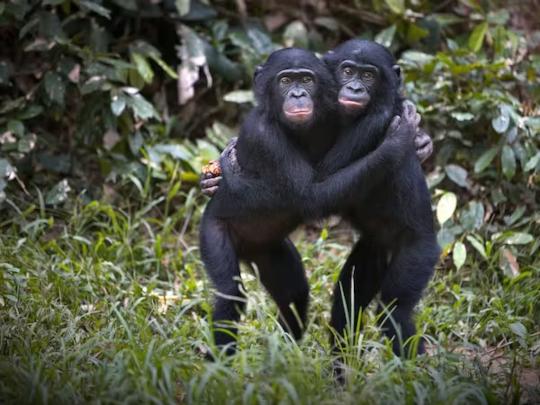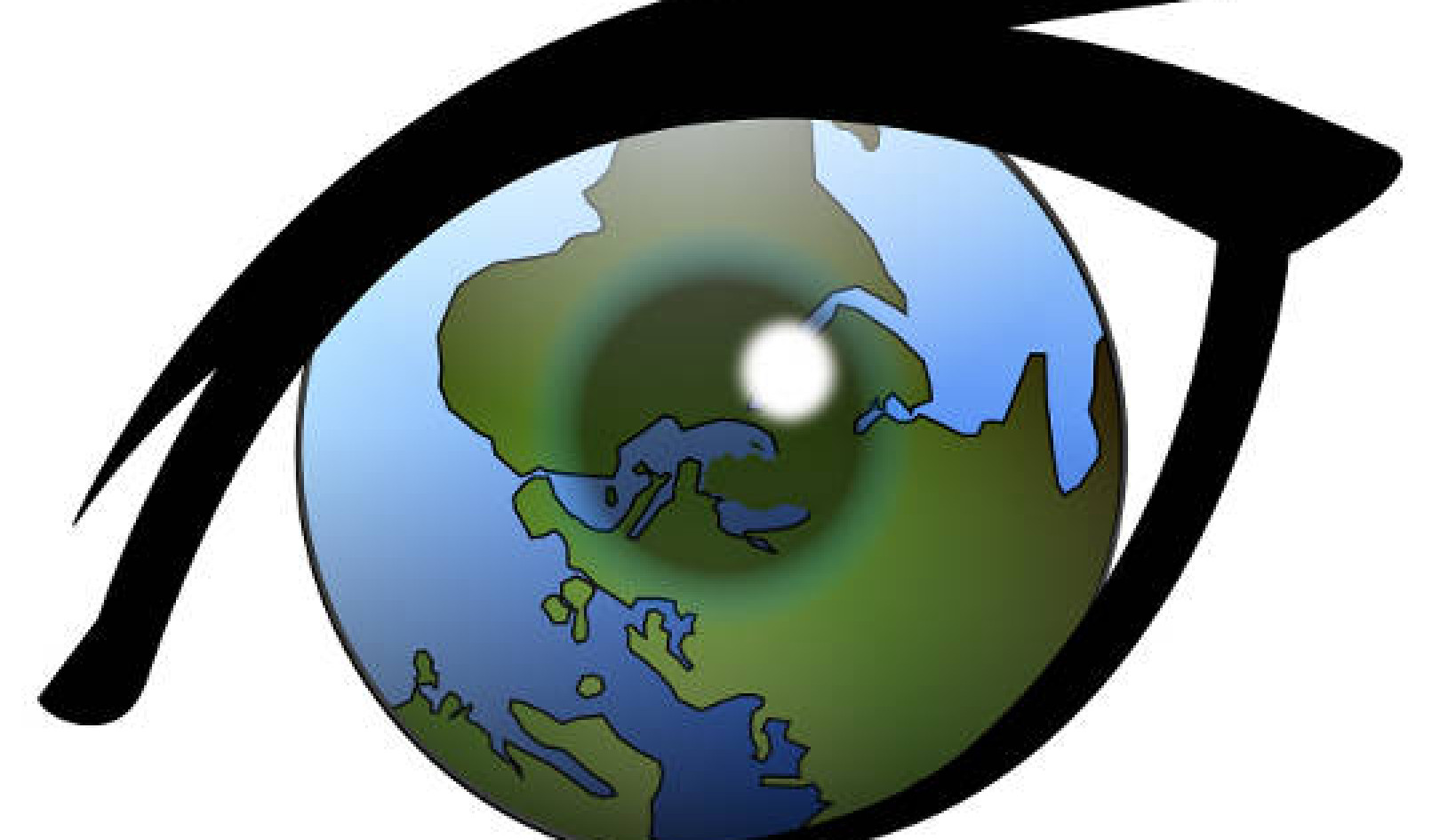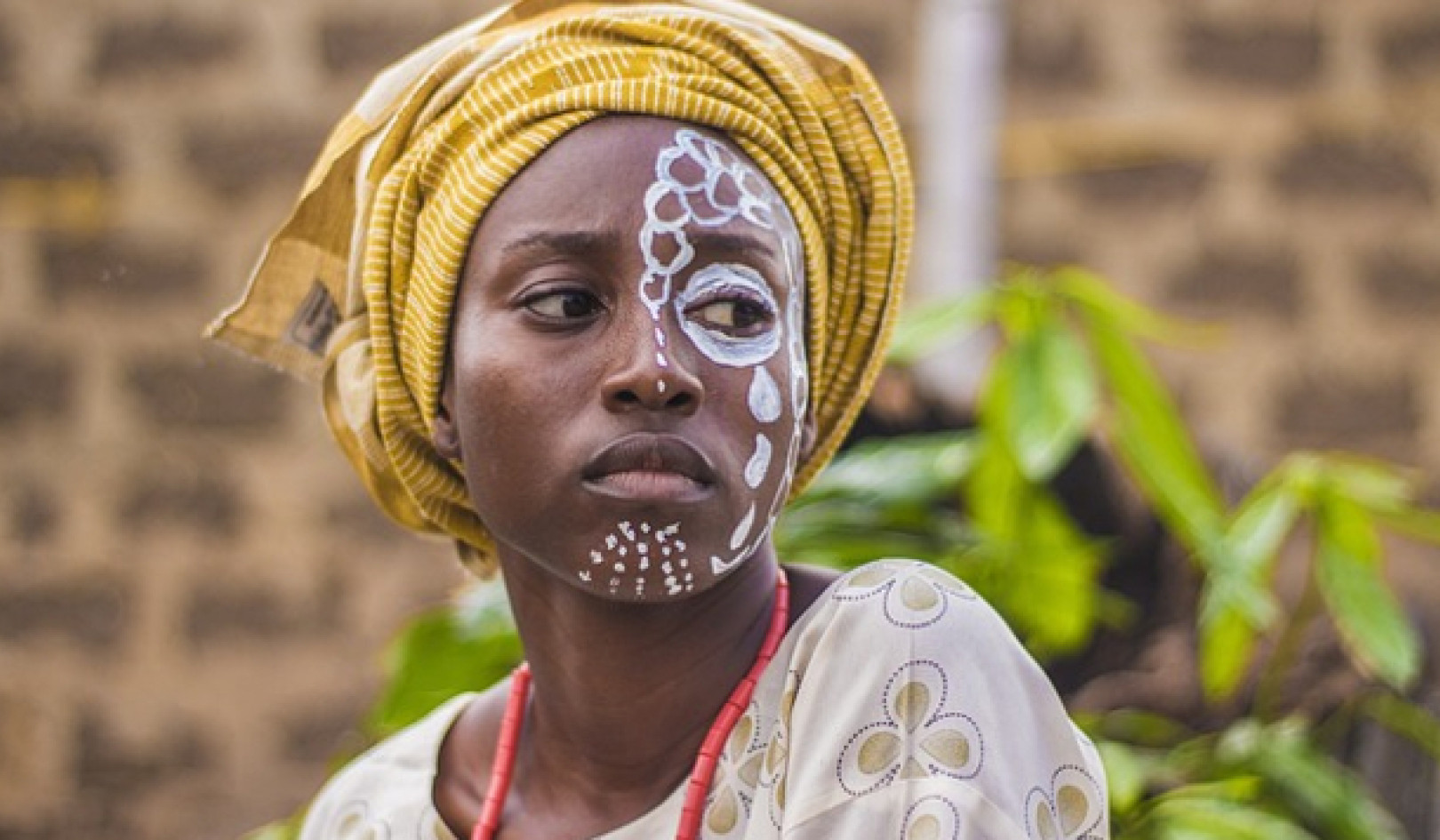
Bonobos are known for their peace-loving nature. Wirestock Creators/Shutterstock
Humans are an interesting mixture of altruism and competition. We work together well at times and at others we will fight to get our own way. To try to explain these conflicting tendencies, researchers have turned to the chimpanzees and the bonobos for insight.
Among the great apes, the chimpanzees and the bonobos are the most genetically related to us as we share about 98.7% of our DNA with them. We share a common ancestor with them as well as anatomical features, complex social hierarchies and problem-solving skills.
Bonobos may be one of our closest cousins but chimpanzees dominated research after Jane Goodall discovered in the 1960s that chimpanzees make and use tools. This finding paved the way for research on chimpanzees as a lens to understand which human aspects are natural rather than socially conditioned. An array of human characteristics, including empathy, playfulness and respect for elders have since been attributed to our shared ancestry with chimpanzees.
The aggressive chimp in us
However, one disturbing characteristic stands out. Chimpanzees “go ape” and attack each other in coordinated assaults. Dutch primate expert Frans de Waal’s 1982 book Chimpanzee Politics included a colourful description of how Luit and Nikkie, two young male chimpanzees, allied to violently usurp Yeroen, the alpha male. They bit and ripped out Yeroen’s testicles and the loss of blood killed him.
One argument scientists have made is that these warlike tendencies are hardwired in us the same way they are hardwired in chimpanzees, which challenges the view that wars are a man-made phenomenon. Chimps can also help us learn about the circumstances that might encourage aggression, such as when rivals are outnumbered or when positions in the status hierarchy are being negotiated.
Nevertheless, J. B. Mulcahy, co-director at the Chimpanzee Sanctuary Northwest in the US, believes aggression only “makes up a very small part of their daily activity”. So some scientists may have overemphasised this trait. Increasingly, research is actually showing how cooperative chimpanzees can be.
The gentle bonobo
Once overlooked, researchers are recognising bonobos as more similar than chimpanzees to humans. Which, considering their reputation as amicable apes, is good news for us.
Unlike the male-dominated groups of chimpanzees, bonobos live in peaceful communities where the chief is female. Indeed, human societies tend to be matriarchal when there is little direct competition for resources.
In bonobo communities, sexual relations play an important role in maintaining relationships and resolving conflicts. For instance, the prospect of food can stir chimpanzees into a hostile frenzy, but bonobos take a more harmonious approach and will gather for what often turns into a polyamorous picnic. There is plenty of sexual play and grooming reminiscent of our own free love movements in hippie culture. While the alpha female is typically smaller than the males, all the females will rally around her to chase the males away should they turn aggressive.
Bonobos are also rather eager to share. Experiments at Lola ya Bonobo, a bonobo sanctuary in the Democratic Republic of Congo, in 2010 show that when bonobos are put in adjacent rooms and one is given food, that bonobo would rather share the food than eat alone. They have also been observed sharing food with those outside of their group, perhaps to make new friends. And they demonstrate a willingness to help others obtain food even if they won’t get to share it.
Bonobos may even have better social intelligence than chimpanzees. In experiments where various animals were presented with upside-down cups with a treat hidden under one of them, chimpanzees kept choosing the cups at random but bonobos (and dogs) looked to the human running the experiment for information on which cup was correct. Bonobos also have brain circuits that seem more predisposed to sharing, tolerance, negotiation and cooperation than chimpanzees.
So where exactly do humans stand? We seem to have incorporated the traits of both species, resulting in a tension between our aggressive and harmonious proclivities. Our tendency for conflict mirrors the competitiveness of chimpanzees, and yet the bonobos teach us that we have it in us to be altruistic and that society can be organised in more peaceful ways. This selflessness underlies the large-scale cooperation that has helped Homo sapiens share ideas, form nations, explore the universe and outlast other early humans such as Homo erectus.
And while the idea of societies built on free love may sound like a utopian fairytale, we do seem to be opening up to alternative mating practices such as consensual non-monogamy in response to a world that is getting increasingly jaded with traditional notions of gender and relationship structures. The flexibility of human behaviour is after all the cornerstone of our remarkable adaptability. So it can’t hurt to be open to new possibilities.
About The Author
![]() Jose Yong, Assistant professor of Psychology , Northumbria University, Newcastle
Jose Yong, Assistant professor of Psychology , Northumbria University, Newcastle
This article is republished from The Conversation under a Creative Commons license. Read the original article.

Related Books:
Atomic Habits: An Easy & Proven Way to Build Good Habits & Break Bad Ones
by James Clear
Atomic Habits provides practical advice for developing good habits and breaking bad ones, based on scientific research on behavior change.
Click for more info or to order
The Four Tendencies: The Indispensable Personality Profiles That Reveal How to Make Your Life Better (and Other People's Lives Better, Too)
by Gretchen Rubin
The Four Tendencies identifies four personality types and explains how understanding your own tendencies can help you improve your relationships, work habits, and overall happiness.
Click for more info or to order
Think Again: The Power of Knowing What You Don't Know
by Adam Grant
Think Again explores how people can change their minds and attitudes, and offers strategies for improving critical thinking and decision making.
Click for more info or to order
The Body Keeps the Score: Brain, Mind, and Body in the Healing of Trauma
by Bessel van der Kolk
The Body Keeps the Score discusses the connection between trauma and physical health, and offers insights into how trauma can be treated and healed.
Click for more info or to order
The Psychology of Money: Timeless lessons on wealth, greed, and happiness
by Morgan Housel
The Psychology of Money examines the ways in which our attitudes and behaviors around money can shape our financial success and overall well-being.
























